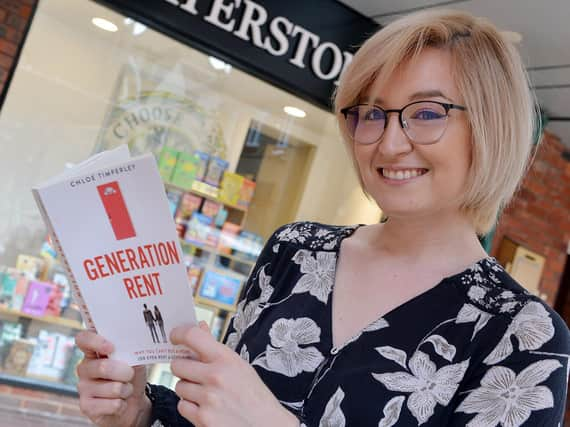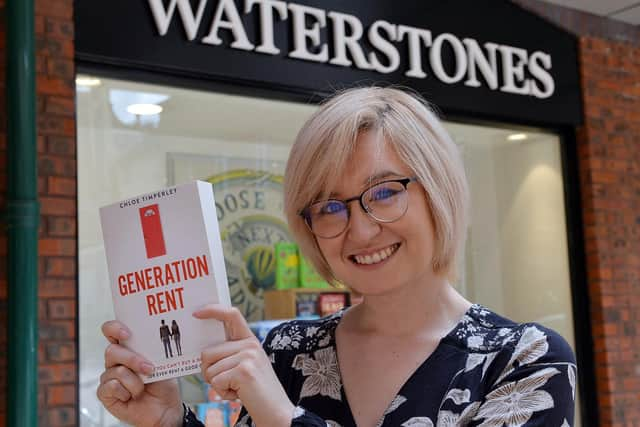Sheffield author on why 'Generation Rent' can't buy a home - or even rent a good one


I got followed home on the bus one day by this weird guy and I thought 'Right, I'm not doing buses anymore, I don't feel safe'," she says.
"The cost of having a car and a flat just meant that I ended up in thousands of pounds worth of debt. I just felt my life was massively behind and not really progressing. So many people are either renting, or living with parents, or if they are on the property ladder it's because their parents gave them money. There's an inherent sense that something's really gone wrong here."
Advertisement
Hide AdAdvertisement
Hide AdWhat Timperley describes as her 'nerdy interest' in land and property grew into a desire to examine in close detail the reasons behind the housing crisis in Britain – a nation where rents rose 60 per cent faster than wages between 2011 and 2017 according to the charity Shelter, large new estates take a painfully slow average of 15 years to build and where Bank of England records show that the number of first-time buyers has slumped by nearly a quarter since 2006.


With a background as a playwright, she switched to prose and won – literally, via a proposal competition – a book deal with independent imprint Canbury Press, and the resulting volume has now been published.
Timperley's book, Generation Rent, studies the vertiginous rise in property prices that has commodified homes since the 1990s, the restrictive criteria that can make mortgages unobtainable, the prolonged increase in homelessness across the UK, and the results of the Thatcher government's controversial Right To Buy policy – along with much more besides.
The author, who grew up in Sheffield and still lives in the city, went 'undercover' at landlord events, spoke to MPs and activists, and joined a tenants' union, as well as speaking to scores of young people who shared eye-opening stories of poor quality accommodation, 'revenge evictions' and withheld deposits.
Advertisement
Hide AdAdvertisement
Hide AdBluntly subtitled 'Why You Can't Buy a Home (Or Even Rent a Good One)', Timperley's book pulls together the diverse strands of what she readily admits is a 'sprawling' topic.
"For me it was like solving a puzzle," she says. "As much as I wanted to shine a light on what tenants are experiencing, in order to explain why those things were really going on I had to broaden it out. I hope I've made it as accessible as possible and present what the experts say without distorting it too much. It was very daunting but an absolute privilege to tell this story."
Case studies, however, remain at the heart of the investigation.
"One of the things that really shocked me was if you do get a bad landlord how much impunity they have," Timperley observes. "I spoke to people who said the state of their property was so bad the walls were squidgy. There were mushrooms sprouting indoors. My friend told me she woke up in the middle of the night to find sewage gushing out of her kitchen sink."
Advertisement
Hide AdAdvertisement
Hide AdThe worst practices, she says, are usually found 'where you get the most desperate people'. "In a private rented sector where it is really competitive – particularly in London and the South East – if there is anything that pushes you out to the fringes where most mainstream landlords won't accept you, you end up in this situation where you will have to go with a rogue landlord who will do as they please. There's not much you have in the way of power because they can just evict you if you complain."
People are often simply glad to have a home at all, she found.
"I remember on one occasion we knocked on this door and a girl came out – we were asking her questions like 'How would you feel about renting indefinitely?' but her main overriding feeling was 'I'm just really glad I've got somewhere'. She really struggled to get a property. She almost thought she wasn't going to have anywhere to live when she got a new job in Sheffield. When you get to that point you do lower the bar, and because that bar is so low there's no incentive really – for a rogue landlord, at least – to make it nice."
While the state of London's superheated property market is well-documented, Timperley believes the 'worst aspects' of the crisis are 'the same wherever you go' – in Sheffield, there are areas where homes have been allowed to slide into extreme neglect through lack of maintenance, she says.
Advertisement
Hide AdAdvertisement
Hide Ad"When the selective licensing scheme was proposed for Abbeydale Road, Chesterfield Road and London Road, the general quality of housing found there was just really poor and actually dangerous to people's health and their lives, in relation to fire hazards. Even if cost isn't the biggest issue in the North, the quality of housing can be a factor that makes your life absolutely miserable."
Timperley thinks more regulation is on the cards.
"There is a sense that things need to be reformed in the private rented sector. We've seen legislation go through that made it the law for landlords to make their homes fit for human habitation, which sounds like such a crazy, obvious, basic prerequisite, but it was only passed in 2018. That shows the low baseline we're starting from. The Government has pledged to end the Section 21 no-fault eviction, but they haven't really given us any idea of when that's going to be, and what that's going to look like."
Timperley writes at length about social housing and the 'exciting and democratic' boom in municipal property construction that came after World War Two – Right To Buy, she says, facilitated the sale of 2.6 million such homes between 1980 and 2019, putting more than 40 per cent in the hands of private landlords. "It's lost its way and totally misses the point of what the original scheme was about."
The arrival of build-to-rent developments in cities like Leeds and Sheffield will only 'cater to the wealthier end of tenants', Timperley argues.
Advertisement
Hide AdAdvertisement
Hide Ad"Invariably build-to-rent complexes offer rents that are higher than the average market rents," she says. "I've seen some and they look marvellous – there's a gym, and it looks almost like going on holiday, like living in a hotel. There's no way I'd be able to afford it."
Timperley, 29, now rents her own flat in the Sheffield suburb of Walkley. She still has a job in finance, and has enjoyed seeing her book stocked on the shelves of her local Waterstones, where she once worked as a coffee shop barista.
She recalls how her parents 'bought a house straight out of university, aged 21', while reflecting that today purchasing a first home is far from a 'get-of-jail-free card' for millennials.
"Actually every single rung of the housing ladder is broken," she says. "Mums and dads are now supporting house purchases for second-time buyers and third-time buyers, people in their 40s - people are taking money out of their pensions to support grown-up children."
Advertisement
Hide AdAdvertisement
Hide AdGeneration Rent cites statistics from Legal & General estimating that, if the so-called 'bank of mum and dad' was a real financial institution, it would be the 11th biggest mortgage lender in the UK.
"The second step is almost harder than the first," Timperley remarks.
A report by Santander last year stated that the dream of home ownership was 'deeply ingrained in the Great British psyche'. Does she worry that this aspiration is impossible to shift?
"It's not impossible, but it is at the crux of why this problem is so difficult," Timperley says.
Advertisement
Hide AdAdvertisement
Hide Ad"At the moment there's a lot of people who have owned homes since the 90s who've seen immense capital gains from the ridiculous growth in house prices throughout that boom in the early 2000s. I think the next generation will have bought in at the top and there's probably not much more room, really. If it starts to stagnate and people realise it isn't going up in value, maybe people's feelings could well change."
Chloe Timperley's book Generation Rent was written and edited before the coronavirus pandemic wreaked havoc with the UK economy - but she says any mooted fall in house prices is unlikely to help those battling to buy a property.
"Unless you already have a substantial deposit saved up, you're probably not going to be able to take advantage of lower prices," she says.
"The whole reason people struggle to save for a deposit in the first place is the cost of rent. If house prices fall, maybe you wouldn't have to take out as big a mortgage, but if people are falling on hard times, they might need to tap into money to meet short-term obligations if they've lost income. The Government did lift restrictions on Lifetime ISAs to help people raid their housing deposit savings to help them get through coronavirus."
Advertisement
Hide AdAdvertisement
Hide AdMeanwhile the Government's stamp duty land tax holiday has caused buy-to-let enquiries to go 'through the roof', Timperley says. "For most homes, first-time buyers were not really affected by stamp duty," she points out.
Ultimately, she says, conclusions about the impact of Covid-19 on the housing crisis are difficult to draw 'until the true extent of the potential job losses and economic fall-out is known'.
"Mass unemployment is usually associated with falling prices, when there is a big recession. But I don't see that benefiting generation rent as such, there might just be more opportunities for investors to swoop in and snap up more properties."
Generation Rent: Why You Can't Buy a Home (Or Even Rent a Good One) is in bookshops now, published by Canbury Press, priced £9.99 in paperback.
Support The Yorkshire Post and become a subscriber today.
Advertisement
Hide AdAdvertisement
Hide AdYour subscription will help us to continue to bring quality news to the people of Yorkshire. In return, you'll see fewer ads on site, get free access to our app and receive exclusive members-only offers.
So, please - if you can - pay for our work. Just £5 per month is the starting point. If you think that which we are trying to achieve is worth more, you can pay us what you think we are worth. By doing so, you will be investing in something that is becoming increasingly rare. Independent journalism that cares less about right and left and more about right and wrong. Journalism you can trust.
Thank you
James Mitchinson